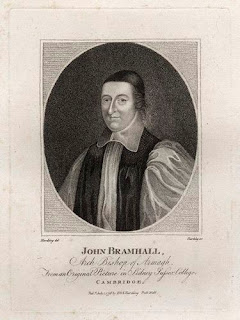A Second Patrick: Taylor on Bramhall and "this National Church"
In his sermon, Taylor draws another comparison between Bramhall and Patrick. Just as Patrick's ministry had established the Church on this Island, even as his homeland experienced the unhappy confusions occasioned by the collapse of Roman Britain, so too did Bramhall's minister as Archbishop of Armagh amidst the ruin inflicted by the Wars of the Three Kingdoms:
There are great things spoken of his Predecessor S. Patrick, that he founded 700. Churches and Religious Convents, that he ordain'd 5000. Priests, and with his own hands consecrated 350. Bishops. How true the story is I know not; but we were all witnesses that the late Primate, whose memory we now celebrate, did by an extraordinary contingency of Providence in one day consecrate two Archbishops and ten Bishops; and did benefit to almost all the Churches in Ireland, and was greatly instrumental to the Reendowments of the whole Clergy; and in the greatest abilities and incomparable industry was inferiour to none of his most glorious Antecessours.
Taylor also pointed to another exemplar from the ancient Irish Church in whom he sees a reflection of Bramhall's ministry: Richard Fitzralph, 14th century Archbishop of Armagh. We might note that Richard came from an Anglo-Norman family, became Vice-Chancellor of Oxford, and - as with Bramhall and Taylor - served in the ecclesia Anglicana (as Dean of Lichfield) before his episcopal appointment in Ireland. For Taylor, Richard's active, reforming ministry as Archbishop of Armagh was reflected in Bramhall's similar ministry as Primate:
Since the Canonization of Saints came into the Church, we find no Irish Bishop canoniz'd, except S. Laurence of Dublin, and S. Malachias of Down; indeed Richard of Armagh's Canonization was propounded, but not effected; but the Character which was given of that learned Primate by Trithemius does exactly fit this our late Father; 'He was learned in the Scriptures, skill'd in secular Philosophy, and not unknowing in the Civil and Canon Laws, (in which studies I wish the Clergy were with some carefulness and diligence still more conversant) he was of an excellent spirit, a scholar in his discourses, an early and industrious Preacher to the people.'
What is more, Taylor also pointed to Bramhall's reverence for the memory of Richard, an expression of how Bramhall and Taylor regarded the Reformed Catholic Church of Ireland as standing in continuity with the pre-Reformation Irish Church:
And as if there were a more particular sympathy between their souls, our Primate had so great a Veneration to his memory, that he purpos'd, if he had liv'd, to have restor'd his Monument in Dundalke, which Time, or Impiety, or Unthankfulness had either omitted or destroyed. So great a lover he was of all true and inherent worth, that he lov'd it in the very memory of the dead, and to have such great Examples transmitted to the intuition and imitation of posterity.
As Taylor had said elsewhere, "our Church before Luther was there where your Church was, in the same place and in the same persons".
Taylor's comparison of Bramhall with Patrick and Richard of Armagh exemplifies how the Restoration Church of Ireland - "this National Church" - understood itself as Irish; indeed, how Taylor and Bramhall understood themselves to be Irish bishops, serving the Irish Church. Evoking Patrick and Richard of Armagh demonstrated how the Irish Church over centuries had been shaped by the movements and exchange of peoples, cultures, and individuals between these Islands. Taylor and Bramhall were Irish bishops no less than Patrick and Richard. The church that Taylor and Bramhall served was Irish no less than the church of Patrick, the church of Richard. Indeed, only a narrow ethno-nationalism, defined by the dark creed of soil and blood, would say otherwise.
On this Saint Patrick's Day, therefore, Irish Anglicans can rejoice with Taylor in "our Church", the Church which was blessed with a second Patrick, securing its place on this Island, after bitter decades which had rendered it "poor afflicted and despised"; a second Patrick who "restore[d] the Church of Ireland to that splendor and fulness".




Comments
Post a Comment